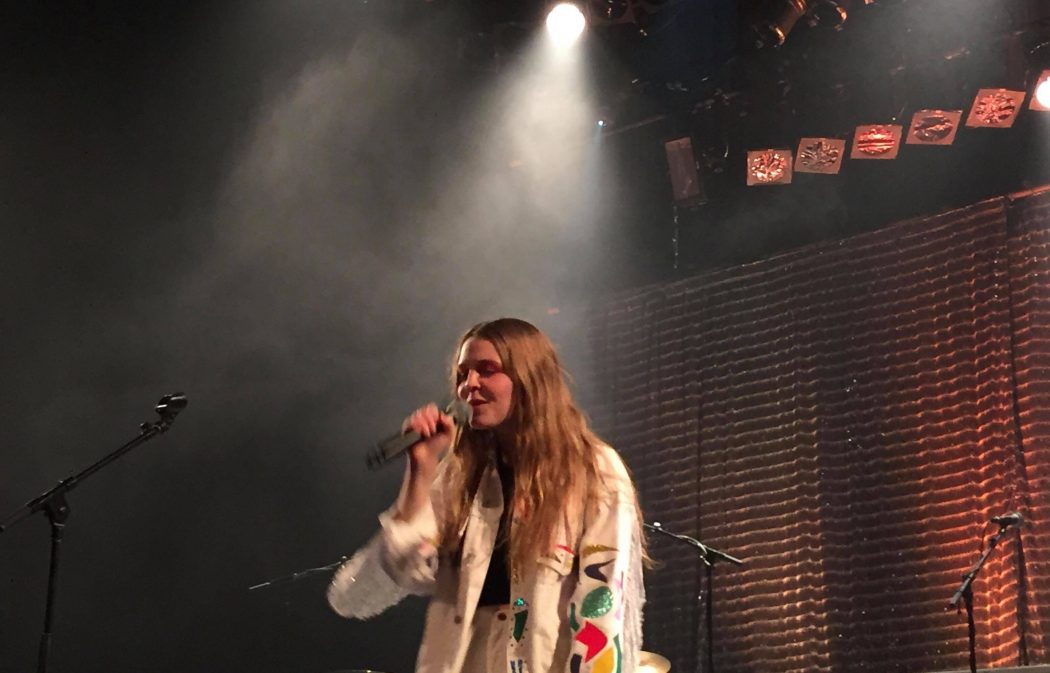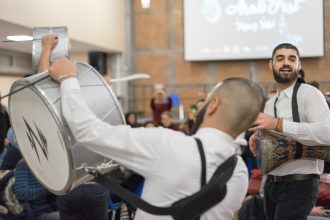Back in November, Maggie Rogers bailed on me. After almost missing her last Montreal show in April 2017 – which I managed to snag a ticket to when it got moved from La Sala Rossa to Corona Theatre due to popular demand – I made sure to buy my ticket right when they went on sale this time around. Despite the upcoming show being at MTELUS, a significantly larger venue, I knew not to take any chances with an artist experiencing a meteoric rise like Maggie.
Considering her increasing success, I shouldn’t have been surprised when, in October, I was watching Saturday Night Live and an announcement flashed before a commercial break that she’d be the musical guest on November 3rd. After a moment of celebrating and informing all the friends that I’ve managed to convert into Maggie stans, I put two and two together and realized this meant she wouldn’t be making it to her Montreal show on the 2nd. She regretfully shared a few days later that the concert would be postponed to March.
While the loads of attention and admiration she receives threaten to catapult her into fame, she has continuously displayed a commitment to slowing it all down.
It can be bittersweet when you watch an artist who once felt like your little secret start popping up on everyone’s radar. As concert venues get larger, ticket prices get higher and shows become less intimate. If you want a spot only a few rows from the stage, you’re going to have to show up a hell of a lot earlier and possibly, be prepared to fight some people. However, with Maggie, it’s clear there’s no reason to fear any loss of intimacy. While the loads of attention and admiration she receives threaten to catapult her into fame, she has continuously displayed a commitment to slowing it all down.
After the famous video of Pharrell being floored by Maggie’s song, ‘Alaska’ trickled across the Internet in June 2016, a lot happened to Maggie real fast. Right after completing her undergraduate degree at NYU, she signed a deal with Capitol Records. Headlining shows and festival performances around the world quickly followed the official release of ‘Alaska.’
For an artist whose breakout hit was a gentle dance-folk ode to finding mental clarity by tuning in to the rhythm of your steps while hiking, it’s understandable that the protracted uprootedness of tour life would be destabilizing. After almost a year of extensively promoting her EP, Now That The Light Is Fading, she posted a handwritten note to Instagram – a medium she uses to make interactions with fans a little more personal – saying that she was taking a needed hiatus. “The music is always there, you just have to be still enough to listen. It’s time to take stock, to check in, to find out who I am now.”
Eight months later, Maggie returned with ‘Fallingwater.’ I was travelling across Southeast Asia at the time. I woke up in Bangkok on the morning of the song’s release and reached for my headphones. After an intro of thumping drums and forceful piano chords, Maggie belts out “HOLD ON” in a harrowing howl. Hearing Maggie sing with that much power is arresting, and then the second half of the song is a softer reprise of the chorus that releases and washes over you. For the next month of my trip, this song became my respite from a tiring itinerary of touring cities and hopping between countries. It became a means of carving out a moment in my day to regain my bearings amidst constant change and motion. It’s the song I cried to as my flight home took off and I tried to wrap my head around all that I had just experienced in such a relatively short period of time.
Likening oneself to falling water can evoke an image of peaceful surrender, but there can also be a worrisome dimension to it when viewed as depicting the lack of agency in one passively flowing forward. There is a conflict between the pressure to be present in the moment – to let life take you where it takes you – and the pressure to stop from time to time to introspect and make sure you’re going in the right direction. Sometimes, once we step back to process all the life we were so consumed in living, it becomes too much to make sense of and we feel like yelling “HOLD ON.” Yet retreating seems necessary because we don’t trust ourselves to extract all that is of value from an experience until we make the conscious effort to pause and ask: How do I appreciate this? How will I remember this? How might I grow from this?
In October, Maggie put out another single, ‘Light On,’ off her forthcoming debut studio album, Heard It in a Past Life, that chronicles these same anxieties that leave you “crying in the bathroom” even when everything seems to be working out. When she premiered the song on Beats 1 Radio, she explained: “So much had happened to me that I really wanted to make sure if and when I put this record out that it was me deciding to go down this road.” So, she stopped and listened.
Listening might just be allowing everything to become still and quiet enough for you to see whether you are comfortable enough to sit in it.
There often aren’t clear answers to all the questions we ask ourselves in a desperate attempt to gain some control over the endless procession of life’s events. When I cried on the plane, I hadn’t asked myself any of these questions actually. There was no specific thought on my mind because I didn’t even know where to start thinking. I struggled to contemplate how radically life could change and then abruptly revert back to its ordinary course. Maybe I shouldn’t have been trying to think. Listening might just be allowing everything to become still and quiet enough for you to see whether you are comfortable enough to sit in it. Then you can know whether you are where you are supposed to be.
The title ‘Fallingwater’ references the house in the mountains of Southwestern Pennsylvania, designed in 1935 by renowned architect Frank Lloyd Wright. When looking at the exquisite structure, it’s a marvel that it manages to rest on the cusp of a waterfall. Maggie’s art is similarly embedded in nature. She has sampled birds as percussion and frogs as synths, but her music’s earthly quality also emanates from her ability to stand steady in the face of the world’s overwhelming chaos and beauty. Her songs are so vitalizing because they are born out of an acceptance that, regardless of how incomprehensible life might seem, choosing to dance anyway grounds you in the center of it.
When Maggie returns to Montreal in March, a lot will have changed for her since her last concert here. Her eyes won’t scan the room in utter shock as they did at Corona Theatre when she tried to process the fact that she sold out a 1000-person venue for the first time. After performing in front of massive festival crowds and being an opener for an arena tour, MTELUS won’t mark any major milestone. However, we can count on Maggie to be entirely present. She’ll know she’s exactly where she should be and everyone watching will too.
Heard It in a Past Life is out now.
Tickets to her Montreal show on 3/22 are available here.








